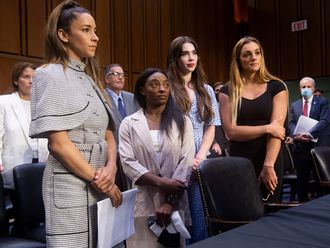Moscow/Washington: Russia threatened to retaliate against new sanctions passed by the US House of Representatives, saying they made it all but impossible to achieve the Trump administration’s goal of improved relations.
The measures push US-Russia ties into uncharted territory and “don’t leave room for the normalisation of relations” in the foreseeable future, Russian Deputy Foreign Minister Sergei Ryabkov said Wednesday, according to the Interfax news service.
Hope “is dying” for improved relations because the scale of “the anti-Russian consensus in Congress makes dialogue impossible and for a long time,” Konstantin Kosachyov, chairman of the international affairs committee in Russia’s upper house of parliament, said on Facebook. Russia should prepare a response to the sanctions that’s “painful for the Americans,” he said.
The bill passed by a vote of 419-3 on Tuesday strengthens sanctions against Russia less than three weeks after President Donald Trump and his Russian counterpart Vladimir Putin held their first official meeting at the Group of 20 summit. The measure, which now goes to the Senate, requires Trump to seek congressional approval before easing sanctions imposed under the Obama administration for Russian meddling in the 2016 presidential elections and its support for separatists in Ukraine. The White House has sent mixed signals about whether Trump will sign the bill.
‘Anti-Russian Hysteria’
Trump will sign the law because “he’s a prisoner of Congress and anti-Russian hysteria,” Alexei Pushkov, a senator in Russia’s upper house of parliament, said on Twitter. The sanctions are “a new stage of confrontation,” he said.
McDonald’s restaurants in Russia aren’t “a sacred cow” and should face “sanitary sanctions,” Pushkov said in a separate tweet. The fast food chain’s press office in Russia declined to comment immediately. The largest McDonald’s in Russia was shuttered for three months in 2014 amid about 250 safety probes of the company’s restaurants by officials after the US imposed sanctions over Russia’s annexation of Crimea.
Russia has prepared “economic and political measures that will be adopted if the Senate and Trump support the bill,” said Vladimir Dzhabarov, deputy chairman of the international affairs committee in the upper house, the RIA Novosti news service reported. Relations with the US “are at such a low level that we have nothing to lose” by retaliating, he said.
Putin said after the meeting in Hamburg that he believed Trump accepted his denial that Russia interfered in the election. Congressional committees and the Federal Bureau of Investigation are examining possible collusion between the Trump campaign and Russia, which Trump has dismissed as a “witch hunt.”
The House vote adds to deepening Russian gloom over prospects for a breakthrough in relations with Trump, six months after he took office pledging to improve ties with Putin. Russia threatened last week to expel US diplomats and seize embassy property in Moscow, after Ryabkov failed to gain agreement at talks in Washington for the return of Russian diplomatic compounds taken by the Obama administration in December in response to the election hacking.
The US House of Representatives voted overwhelmingly on Tuesday to slap new sanctions on Russia and force Trump to obtain lawmakers’ permission before easing any sanctions on Moscow, in a rare rebuke of the Republican president.
It was unclear how quickly the bill would make its way to the White House for Trump to sign into law or veto. The bill still must be passed by the Senate, which is mired in debate over efforts to overhaul the US healthcare system as lawmakers try to clear the decks to leave Washington for their summer recess.
The sanctions bill comes as lawmakers investigate possible meddling by Russia in the 2016 presidential election and potential collusion by Republican Trump’s campaign.
Moscow has denied it worked to influence the election in Trump’s favour, and he has denied his campaign colluded.
The White House said the president had not yet decided whether he would sign the measure. Rejecting the bill — which would potentially hamper his hopes of pursuing improved relations with Moscow — would carry a risk that his veto could be overridden by lawmakers.
“While the president supports tough sanctions on North Korea, Iran and Russia, the White House is reviewing the House legislation and awaits a final legislative package for the president’s desk,” said spokeswoman Sarah Sanders.
House members backed the bill, which also imposes sanctions on Iran and North Korea, by a near-unanimous margin of 419-3, with strong support from Trump’s fellow Republicans as well as Democrats, despite objections from Trump, who wanted more control over the ability to impose sanctions.
The Republican-controlled Senate passed an earlier version of the bill with near-unanimous support. The House added the North Korea measures after becoming frustrated with the Senate’s failure to advance a bill it passed in May.
Representative Ed Royce, the Republican chairman of the House Foreign Affairs Committee, said the three countries “are threatening vital US interests and destabilising their neighbours. It is well past time that we forcefully respond.” But the combined bill has run into objections from some senators, who are unhappy that the House added the North Korea sanctions after holding up the measure for more than a month.












